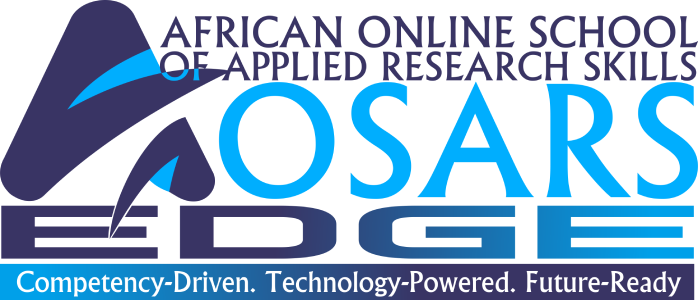PHD STUDENTS SENSITIZED ON NEW AOSARS PROGRAMS AND REVAMPED E LEARNING FEATURES

PHD STUDENTS SENSITIZED ON NEW AOSARS PROGRAMS AND REVAMPED E LEARNING FEATURES
AOSARS on 7th June, 2025, held a sensitization meeting for PhD students with the primary purpose of offering continuation to existing students into the new e-learning platform and introducing the new and revamped e-learning system accessible at aosars.com. The meeting was conducted to familiarize students with the enhanced features and functionalities of the updated digital learning environment that supports research education across Africa. The new features include community features, integration of ethical AI into research software courses, and modularization of course offerings.
During the meeting, participants were informed about the registration process for new students who can access the platform through https://aosars.com/student-registration/. This registration portal allows prospective students to create accounts and explore the available course offerings. The system has been designed to streamline the enrollment process and provide immediate access to relevant learning materials based on individual research interests and academic backgrounds. A major focus of the meeting was the continuation process for existing students into the e-learning platform, which requires all previously registered students to reactivate their profiles in the new website. This reactivation process is done through clicking on the “forgot password” link available at https://aosars.com/dashboard/retrieve-password/ and changing their login credentials to ensure continued access to the platform and their academic progress.
The sensitization meeting addressed the new modular approach to course delivery that will be implemented across all programs. The meeting noted that going forward, courses will be offered in a modular manner such that students can access the specific modules they require and enable the spacing of the modules according to their learning needs and schedules. This modular approach allows for more flexible learning pathways and enables students to focus on particular skills or knowledge areas as needed. The specialized offerings available for PhD students through https://aosars.com/postgraduate-research-e-courses/ are specifically designed to address the advanced research methodology requirements of doctoral-level students and provide comprehensive training modules that cover various aspects of research conducted within African academic contexts.
A significant portion of the meeting focused on the integration of artificial intelligence specifically in research software courses. This AI integration is limited to research software training and will be used exclusively for ethical AI applications to ease the process of learning the software and ensure responsible application of AI tools in research contexts. The meeting emphasized that the new courses on research software will come embedded with “ethical AI use” components, representing a systematic approach to incorporating AI tools and methodologies into research education while maintaining ethical standards and best practices. Students will learn to leverage AI capabilities while maintaining academic integrity and understanding the appropriate boundaries for AI utilization in research contexts. The first course demonstrating this AI integration was presented as “A Complete Guide to Research Topic and Objectives Development for PhD Theses with Ethical AI Utilization and Past African-Based Theses Examples,” which is accessible at https://aosars.com/courses/a-complete-guide-to-research-topic-and-objectives-development-for-phd-theses-with-ethical-ai-utilization-and-past-african-based-theses-examples/. This course combines traditional research methodology with contemporary AI applications while incorporating examples from previous African research projects to provide contextual learning opportunities. The course content includes guidance on developing research topics and objectives for PhD theses while utilizing artificial intelligence tools in an ethical manner. It features practical examples drawn from past African-based theses to demonstrate successful research approaches within familiar academic and cultural contexts. This approach helps students understand how research methodologies can be applied effectively within their specific regional and academic environments.
The meeting emphasized the integration of research software simulations within the e-learning platform to enable learners to engage in practical, hands-on experience. The implementation will feature two complementary formats designed to support comprehensive skill development: a training format that provides structured, guided instruction through step-by-step demonstrations and explanations of research software functions, allowing learners to build foundational knowledge and understanding of core concepts, and a practice format that offers an independent, exploratory environment where students can apply their acquired knowledge, experiment with various features, and work through real-world scenarios and projects using the simulated research software. This dual-format approach follows sound pedagogical principles by creating a natural progression from guided learning to autonomous practice, ensuring that learners first master fundamental concepts through structured training before advancing to hands-on application in a risk-free simulated environment that reinforces and solidifies their technical skills.




